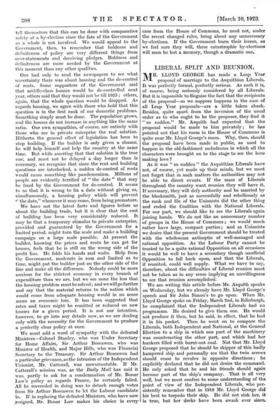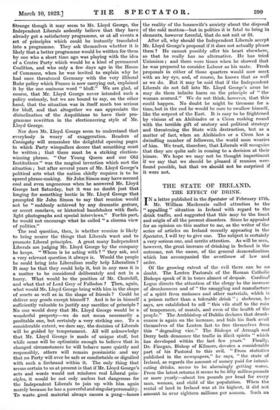LIBERAL SPLIT AND REITNION.
MR. LLOYD GEORGE has made a Leap Year proposal of marriage to the Asquithian Liberals. It was perfectly formal, perfectly serious. As such it is, of course, being seriously considered by all Liberals. But it is impossible to tlisguise the fact that the recipients of the proposal—as we suppose happens in the case of all Leap Year proposals—are a little taken aback. Besides, quite apart from the inversion of the usual order as to who ought to be the proposer, they find it "so sudden." Mr. Asquith had expected that the proposal would be made to him privately; he has pointed out that his room in the House of Commons is quite near Mr. Lloyd George's room. Why, then, should the proposal have been made in public, as used to happen in the old-fashioned melodrama in which all the characters were brought on to the stage to see the hero making love ?
As it was "so sudden" the Asquithian Liberals have not, of course, yet made up their minds, but we must not forget that in such matters the authorities may not be able to direct events. If the mass of Liberals throughout the country want reunion they will have it. If necessary, they will defy authority and be married by the blacksmith, just as successfully and rebelliously as the rank and file of the Unionists did the other thing and ended the Coalition with the National Liberals. For our part, we should like to see the Liberals again joining hands. We do not like an unnecessary number of groups in the House of Commons ; we would much rather have large, compact parties; and as Unionists we desire that the present Government should be treated with the wholesome antiseptic of well-managed and rational opposition. As the Labour Party cannot be trusted to be a quite rational Opposition on all occasions it would be well to have a secondary though unofficial Opposition to fall back upon, and that the Liberals, if reunited, could well supply. What we have to say, therefore, about the difficulties of Liberal reunion must not be taken as in any sense implying an unwillingness to see that reunion accomplished. We are writing this article before Mr. Asquith speaks on Wednesday, but we already have Mr. Lloyd George's speech and Sir John Simon's to go upon. When Mr. Lloyd George spoke on Friday, March 2nd, in Edinburgh, he complained that the Independent Liberals had no programme. He desired to give them one. He would not produce it then, but he said, in effect, that he had it in his pocket. Then he went on to compare the Liberals, both Independent and National, at the General Election to a ship in which one part of the machinery was counteracting the other part, and which had her bunkers filled with burnt-out coal. Not that Mr. Lloyd George proposed that he should be skipper of this badly hampered ship and personally see that the twin screws should cease to revolve in opposite directions ; he explicitly declared that he did not desire the command. He only asked that he and his friends should again become part of the ship's company. That is all very well, but we must confess to some understanding of the point of view of the Independent Liberals, who per- sistently remember that in 1918 Mr. Lloyd George did his best to torpedo their ship. He did not sink her, it is true, but her decks have been awash ever since. Strange though it may seem to Mr. Lloyd George, the Independent Liberals ardently believe that they have already got a satisfactory programme, or at all events a set of principles which could be instantly translated into a programme. They ask themselves whether it is likely that a better programme would be written for them by one who a short time ago was playing with the idea of a Centre Party which would be a kind of permanent Coalition, and who only a few days ago in the House of Commons, when he was invited to explain why he had once threatened Germany with the very illiberal Ruhr policy which France is now carrying out, explained it by the one ominous word "bluff." We are glad, of course, that Mr. Lloyd George never intended such a policy seriously, but we are bound to say, on the other hand, that the situation was in itself much too serious for bluff, and that altogether we can appreciate the disinclination of the Asquithianq to have their pro- gramme rewritten in the electioneering style of Mr. Lloyd George.
Nor does Mr. Lloyd George seem to understand that everybody is weary . of exaggeration. Readers of Coningsby will remember the delightful opening pages in which Party wirepullers decree that something must be written ; that there must be a striking election- winning phrase. "Our Young Queen and our Old Institutions" was the magical invention which met the situation ; but after several years of Mr. Lloyd George's political arts what the nation chiefly requires is to be spared phrase-making. Sir John. Simon may have seemed cool and even ungenerous when he answered Mr. Lloyd George last Saturday, but it was no doubt just that longing for something hectic in 'Mr. Lloyd George that prompted Sir John Simon to say that reunion would not be " suddenly 'achieved by any dramatic gesture, or secret conclave, or historical handshakes with flash- light photographs and special interviews." For his part, he would not encourage what he called "a cinema view of polities."
The real question, then, is whether reunion is likely to bring nearer the things that Liberals want and to promote Liberal principles. A great many Independent Liberals are judging Mr. Lloyd George by the company he keeps. ' "Whom is he acting with ? " they . ask, and a very relevant question it always is. Would the people he could bring into Liberalism really help Liberalism ? It may be that they could help it, but in any ease it is a matter to be considered deliberately and not in a hurry. What would be the position of Mr. Churchill, and what that of Lord Grey of Fallodon ? Then, again, what would Mr. Lloyd George bring with him in the shape of assets as well as, in the shape of friends? Could he deliver any goods except himself? And is he in himself sufficiently valuable to justify any sacrifice of principle ? No one would deny that Mr. Lloyd George would be a wonderful property—we do not mean necessarily a profitable one, but certainly, a very striking one. To a considerable extent, we dare say, the decision of Liberals will be guided by temperament. All will acknowledge that Mr. Lloyd George is made of unique stuff, but while some will be optimistic enough to believe that in changed circumstances he will behave more quietly and responsibly, others will remain pessimistic and say that no Party will ever be safe or comfortable or dignified with such a firebrand within it. The only thing that seems certain to us at present is that if Mr. Lloyd George's acts and words would not reinforce real Liberal prin- ciples, it would be not only useless but dangerous. for the Independent Liberals to join up with him again merely because he has a powerful and singularpersonality. To waste good material always causes a pang—hence the reality of the housewife's anxiety about the disposal of the cold mutton—but in politics it is fatal to bring in elements, however forceful, that do not suit or fit.
After all, why should the Independent Liberals accept Mr. Lloyd George's proposal if it does not actually please them ? He cannot possibly offer his heart elsewhere, so that he really has no alternative. He has tried Unionism ; and there were times when he showed that he was prepared to consider Labour as his mate. Fresh proposals in either of those quarters would now meet with an icy eye, and, of course, he knows that as well as we do. But it may be said that if the Independent Liberals do not fall into Mr. Lloyd George's arms he may do them infinite harm on the principle of "the woman scorned." We do not think, however, that this could happen. No doubt he might be tiresome for a time, but in the end he would be sure to swallow himself, like the serpent of the East. It is easy to be frightened by visions of an Alcibiades or a Cleon rushing round with the terrible gift of oratory and political strategy and threatening the State with destruction, but as a matter of fact, when an Alcibiades or a Cleon has a dwindling number of followers, the world soon wearies of him. We trust, therefore, that Liberals will recognize that they are quite safe in coming to a decision at their leisure. We hope we may not be thought impertinent if we say that we should be pleased if reunion were found possible, but that we should not be surprised if it were not.











































 Previous page
Previous page